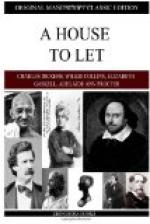“Before I offer any opinion on what I have heard,” he said, earnestly and anxiously, after Trottle had done, “I must be allowed, in justice to myself, to explain my own apparent connection with this very strange and very shocking business. I was the confidential legal adviser of the late Mr. Forley, and I am left his executor. Rather more than a fortnight back, when Mr. Forley was confined to his room by illness, he sent for me, and charged me to call and pay a certain sum of money here, to a man and woman whom I should find taking charge of the house. He said he had reasons for wishing the affair to be kept a secret. He begged me so to arrange my engagements that I could call at this place either on Monday last, or to-day, at dusk; and he mentioned that he would write to warn the people of my coming, without mentioning my name (Dalcott is my name), as he did not wish to expose me to any future importunities on the part of the man and woman. I need hardly tell you that this commission struck me as being a strange one; but, in my position with Mr. Forley, I had no resource but to accept it without asking questions, or to break off my long and friendly connection with my client. I chose the first alternative. Business prevented me from doing my errand on Monday last—and if I am here to-day, notwithstanding Mr. Forley’s unexpected death, it is emphatically because I understood nothing of the matter, on knocking at this door; and therefore felt myself bound, as executor, to clear it up. That, on my word of honour, is the whole truth, so far as I am personally concerned.”
“I feel quite sure of it, sir,” I answered.
“You mentioned Mr. Forley’s death, just now, as unexpected. May I inquire if you were present, and if he has left any last instructions?”
“Three hours before Mr. Forley’s death,” said Mr. Dalcott, “his medical attendant left him apparently in a fair way of recovery. The change for the worse took place so suddenly, and was accompanied by such severe suffering, to prevent him from communicating his last wishes to any one. When I reached his house, he was insensible. I have since examined his papers. Not one of them refers to the present time or to the serious matter which now occupies us. In the absence of instructions I must act cautiously on what you have told me; but I will be rigidly fair and just at the same time. The first thing to be done,” he continued, addressing himself to Trottle, “is to hear what the man and woman, down-stairs, have to say. If you can supply me with writing-materials, I will take their declarations separately on the spot, in your presence, and in the presence of the policeman who is watching the house. To-morrow I will send copies of those declarations, accompanied by a full statement of the case, to Mr. and Mrs. Bayne in Canada (both of whom know me well as the late Mr. Forley’s legal adviser); and I will suspend all proceedings, on my part, until I hear from them, or from their solicitor in London. In the present posture of affairs this is all I can safely do.”




